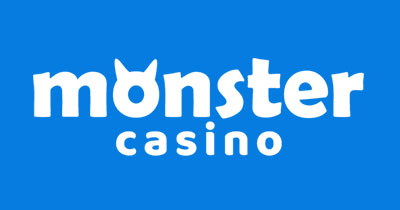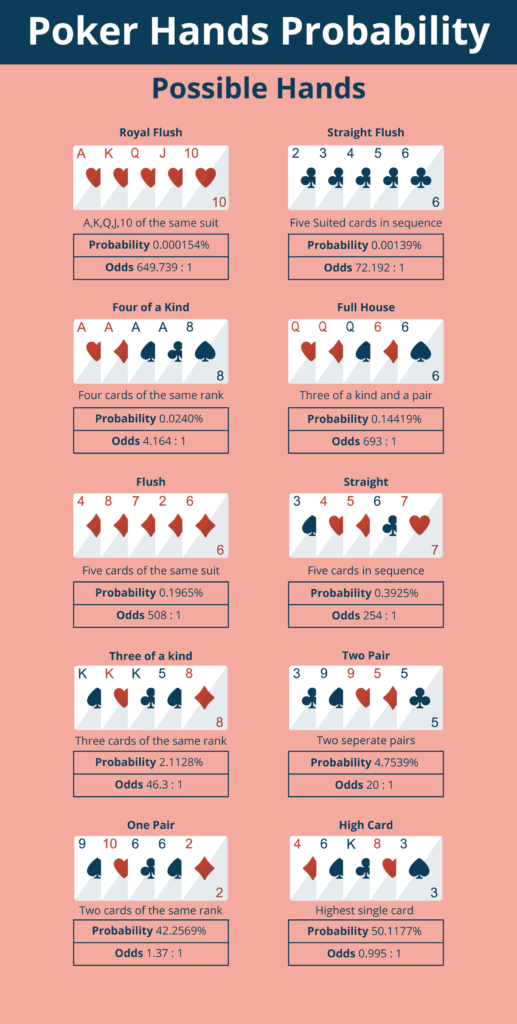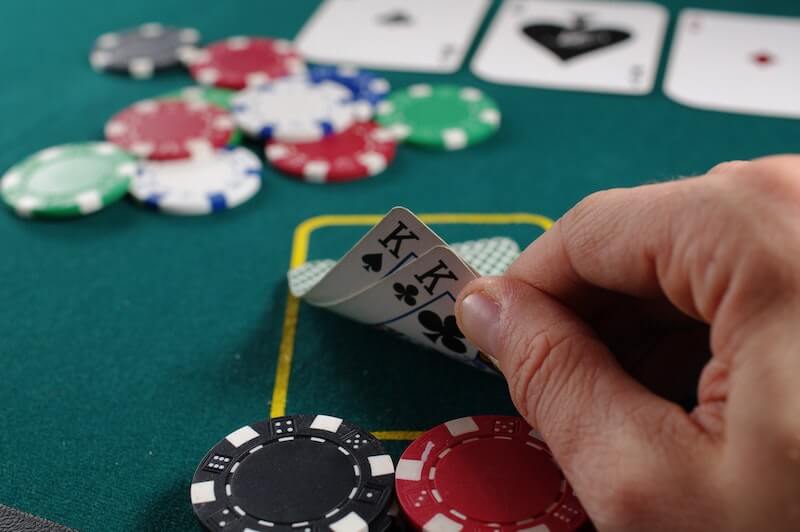Poker Strategy
Find the best poker strategyWith our simple Poker strategy guide, you should be able to ease into any game of Poker sooner than you know it.






What Will You Learn from Our Poker Strategy Guide?
Our guide outlines a number of popular strategies and common Poker terminologies that will have you playing Poker comfortably at any Poker table in a short amount of time.
Why settle for winning a few hands when there are some simple ways to become a more consistent winner?
6 important tips before you start
Before you start playing take a look at these valuable Poker tips that we’ve set up for you below.
1 . Get to know all the rules, odds, bets, and payouts
A basic understanding of the game puts you in a better position to place the right bet in a Poker game session. It’s essential to have some knowledge to have any chance of winning.
2. Choose a Poker variant smartly
The most important thing to remember is to choose a variant where you’re likely to experience success. You should also consider how easy it is to find a particular Poker variant online.
3. Plan your budget – how much are you prepared to win or lose
Responsible gambling is about managing your play-time and your bankroll. By limiting what you spend, you can enjoy playing, knowing that you won’t go overboard.
4. Don’t forget about the time you’re willing to spend on a game
It’s easy to get carried away when you’re winning, but it’s not always healthy. Set a limit to the amount of time you spend playing so that you remain responsible.
5. Take your position into account
You can gain a lot of valuable insight into a game from your position at the table. Your position plays a role in determining the strategy that you use when playing.
6. Learn the lingo
These are some of the more common terms you’ll encounter during a Poker game:
- Flop – This is the second betting round in some Poker variants and the name for the three community cards laid face up on the table.
- Turn – This is the third round of betting in some Poker variants.
- River – The final round of betting in some variants.
- All-in – The term for when you put all your chips in the middle.
- Buy-in – The amount of money you must pay to join a Poker game.
- Call – Match the wager in the current round of betting.
- Fold – Discard your cards when you don’t want to match the existing bet.
- Flush – A hand made up of five cards of the same suit.
- Pot – The prize money that you play for, usually the chips in the middle of the table.

Basic Poker Strategy
The Basic Poker Strategy encompasses the choices you make and your actions during a Poker game. Strategies are integral to success and determine how you blend your skills and the information you have into your next move.
Which playing styles are there?
There are four different playing styles in total.
1. Tight
A tight player plays only the best hands, preferring not to commit chips to hands that could possibly be losing hands. They limit the hands that they play to get the most favourable results.
2. Loose
In contrast to a tight style of play, loose players aren’t selective. They play most hands, even if it means folding (bowing out) in the early stages of the game.
3. Aggressive
Aggressive Poker players have a gung-ho attitude and aren’t afraid of losing. They like to move the game forward by “raising” rather than “calling” and are happy to add to the pot.
4. Passive
Passive players, unlike their Agressive counterparts, don’t like to take chances with their bankroll. They tend to avoid risk and will “call” rather than raise the stake.
When to raise?
You can “raise” when you feel you have a winning hand or want your opponents to think you do. Raising the stake can potentially maximise your winnings.
The most obvious time to raise is after the flop; once the community cards are down. At this point, each player has a full hand and, if yours is particularly strong, you can protect it by raising the stake. This will shake off players who don’t have as much confidence in their cards.
When to call?
A call means you match the existing bet or raise to stay in the game. Different Poker strategies recommend calling at different times.
Call before the flop if you feel your cards can make a playing hand. This Poker strategy involves an element of risk as you can’t predict what the flop will produce or know how it will assist you.
Understanding the pot odds
Pot odds refer to the ratio between the pot size and the bet size. Knowing the pot odds will assist you in deciding on your next action.
We express pot odds either as a ratio or a percentage. The ratio is the most common form, but the percentage is easier to understand if you follow a basic Poker strategy.
Example: If the pot size at the start of the game is £10 and the first bet is £5, the pot increases to £15. We express these pot odds as 15:5 or 3:1. This means that on a bet of half the pot value, you should expect the best hand once out of every four hands to make a successful call.
The psychological aspect – playing the player
When you take your seat at a Poker table, whether in person or virtually, you should have some form of Poker strategy in mind. As important as this is, knowing how to read your opponents is also helpful during the game.
Through practice, you learn to identify certain signs that indicate what action a player will take or what they think of their hand. Are they confident, or are they getting ready to fold? We’ll certainly explore more about this a bit later on this page.
In due time, and with plenty of experience, you’ll be able to exploit weaker players and hold your own among more accomplished opponents.

Advanced Poker Strategy
Anyone can use a basic strategy to get ahead in Poker. But if you want to consistently be on the right side of a winning hand, you should find an Advanced Poker Strategy that works for you.
An Advanced Poker Strategy doesn’t only give you more tricks. It also makes you more aware of when players use these same moves against you.
What is bluffing?
Bluffing is pretending to have a hand that you don’t and acting accordingly. The intention is to get one of your opponents to fold believing that your hand is better than theirs or to make them overconfident about their cards.
How to become good at deception?
Here are some simple Poker strategy tips for improving your bluffing game.
- Perfect your Poker face – Keep a straight face while deceiving your opponents. The trick is to make your face unreadable and give nothing away.
- Play slowly – Make your opponents think you have average cards and are deliberating your next move carefully.
- Maintain the status quo – Don’t change your mannerisms. If you suddenly become very talkative or fidgety, your opponents will become suspicious.
- Think before you speak – Be aware of what you’re saying so that you don’t arouse suspicion.
What is GTO
GTO stands for Game Theory Optimal. It’s a defensive Poker strategy that makes it virtually impossible for players to exploit you. It’s not the best Poker strategy for everyone, but it can be very effective for more experienced players.
GTO uses bluffs and semi-bluffs and invariably causes your opponents to make mistakes. This can result in winning chances for you.
How to master GTO
Here are some simple tips to improve your Game Theory Optimal in Poker.
- Perfect your bluffing techniques – As GTO uses bluffs and semi-bluffs, it’s essential to master these tricks before attempting this Poker strategy.
- Use 3-bets (pre-flop re-raises) – 3-bets lead to opponents with weak hands folding before the flop, which narrows the field.
- Know your odds – Understanding how to calculate pot odds and frequencies will help you play using the GTO Poker strategy.
Hand reading
Hand reading refers to the logical range of hands your opponent could have based on the flop and his actions. As the game progresses, you can narrow down the range and force them to play or fold.
Tells
Tells are subconscious actions by a player in response to a hand. The player may cross their legs, shift their eyes, or clear their throat. By understanding a player’s tells, you gain a strong advantage in the game.
Levelling
The term levelling comes from the phrase “level thinking”. Before deciding on your next move, consider it in terms of what your opponent would think of such a move.
How would they react? Essentially, put yourself in their shoes to consider how they would react to your play.
Which Poker Strategy Should You Choose?
The Poker strategy that you choose depends on your proficiency at Poker. It also depends on whether you’re playing competitively or for fun.
The best strategies to try when you’re new to a casino
- Watch your opponents – Play in reaction to how your opponents play. Observe them to learn their tells so that you can bluff when the time is right.
- Don’t be too cautious – If you think you have a winning hand, play it. The only way to get ahead in Poker is to bet, and if you exercise too much caution, you’ll lose your chance.
- Take a long-term approach – You won’t always win, but don’t get discouraged when you lose. Be in it for the long haul. Over time you’ll win more than you lose.
Poker strategies to play if you’re a pro
- Select profitable starting hands – You don’t need to bet on every starting hand. Tight players who are selective about which hands to bet on have more success than loose players who play more starting hands.
- Keep learning – Even the best players don’t know everything. Take time out occasionally to watch tutorials, observe better players or read Poker books. There’s always something new to learn.
- Calculate the odds – Know the pot odds so that you can make the best calls at the right times. But also estimate the implied odds, which is how much you’ll win if you draw the hand you need.
Video Poker strategy
Any Video Poker strategy from the following options will give you a head start and a chance at success.
- Choose your paytable carefully – By selecting a Video Poker machine with a high RTP, you stand a chance of winning a larger percentage of funds than one where the house edge is higher.
- Use bonuses – Online casinos dangle welcome casino bonuses and promotions to encourage play. Using these bonuses to bankroll your game is a Video Poker Strategy that can pay off. Why not check out some of the deals offered at GGPoker?
- Know the rules – Knowing the value of the different hands in video Poker will help you choose which cards to keep or discard.
Poker tournament strategy
If you’re considering taking Poker to a competitive level, here are some Poker tournament strategy tips to keep in mind.
- Start slowly – At the beginning of the tournament, your focus should be on survival and not winning. Take some time to find your feet. Start observing your opponents to figure out their mannerisms.
- Understand your position – Play according to your stack. If you have a pile of chips, you can afford to be a bit risky, but you should play cautiously if your stack is on the lower side.
- Manage the bubble stage carefully – Every player wants to make it to the bubble stage. Take advantage of cautious players who protect their stack to stay in the bubble, and expand your hand range for better winning opportunities.
Poker strategies that got the most wins
Let’s take a quick look at some of the biggest Poker winners and the strategies they used to get those wins.
Antonio Esfandiari – $18.35 million
One of the biggest Poker wins in history happened at the 2012 WSOP’s Big One For One Drop. An ex-professional magician, Antonio Esfandiari, won big by playing a simple game and keeping his hand ranges strong.
Sam Trickett – $10,112,001
Having turned to Poker after a knee injury ended his football career, Nottinghamshire’s Sam Trickett won over $10 million in WSOP’s 2018 Big One For One Drop.
Sam believes that keeping your emotions under control is one of the most valuable Poker strategy tips, and we couldn’t agree more!
Jamie Gold – $12,000,000
Jamie Gold used an aggressive style of play to win the 2006 WSOP Main Event and boost his coffers with $10 million. He continually forced his opponents to risk their stacks and knew how to read them to make the right plays.
General Beginner Mistakes That Are Easy to Avoid
When trying your hand at Poker, be careful of some of the common beginner mistakes. In particular, don’t give your hand away by the size of your bet. You want to keep your cards private, and large bets may let the cat out of the bag.
Allocate yourself an amount of money to play with, and don’t be scared to lose it. If you continually protect your stack, your opponents will pick up on this and use that fear to their advantage.
Finally, don’t feel compelled to play every hand. You’ll soon learn the value of a good starting hand, but until then, don’t assume that every high card will win the pot.
